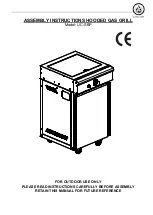
B102163-0-1113
Page 19
Propane Cylinder Safety
Liquid Propane (LP) gas has a long history of safe use when the
safety precautions provided in this manual are followed.
Failure to follow these safety precautions could result in a
fire or explosion causing property damage or personal injury.
Propane gas cylinders should always be handled, stored, and
transported with extreme caution in a secured upright position.
Never attempt to use or repair a propane gas cylinder that has been
damaged. Never attempt to use or repair a cylinder with a faulty or
damaged valve outlet. A cylinder that has been dropped, dented,
or otherwise damaged must be replaced.
A propane gas cylinder should never be transported in the pas-
senger area of a vehicle.
Keep cylinders out of direct sunlight and never apply any other
source of direct heat to them.
When refilling your cylinder, always insist on a reputable, qualified
gas dealer. Your propane gas cylinder is filled by weight, and should
never exceed eighty percent (80%) of its weight limit. If the cylin-
der is not completely empty, the gas dealer must make necessary
adjustments to ensure it is not overfilled. Never use an overfilled
Propane gas cylinder.
Cylinder Storage
Your grill must be stored outdoors in a well ventilated area if the
cylinder is attached to it.
Disconnected cylinders must have a threaded valve plug tightly
installed and must not be stored in any building, garage, or other
enclosed area.
Flammable materials (gasoline, grill covers, etc.) must not be stored
in the cylinder enclosure.
Always store Propane cylinders in a secured upright position, out
of the reach of children.
PROPANE GAS GRILLS
Connection Requirements
Caution: Never use Liquid Propane (LP) gas in a grill designed
for Natural gas, or Natural gas in a grill designed for Liquid
Propane gas. Questions regarding different types of gases
should be directed to your local gas supplier.
Installation must conform to local codes or, in the absence of local
codes, with the National Fuel Gas Code, ANSI Z223.1. In Canada,
installation shall be in accordance with CAN/CGA-B149.2 Propane
Installation Code, or CAN/CGA-B149.1 Natural Gas Installation
Code, and local codes where applicable. Consult your local gas
supplier or propane gas dealer for code regulations and recom-
mended procedures.
Warning: Broilmaster
®
Premium Gas Grills require Liquid
Propane (LP) cylinders equipped with an Overfill Protection
Device (OPD). An overfilled or improperly filled Propane cyl-
inder can be dangerous.
Always use the pressure regulator and hose assembly supplied
with your Propane gas grill.
Note: Not all valve and cylinder combinations are compatible.
Check warning tag on valve and cylinder as well as external fitting
threads.
All Broilmaster
®
pressure regulators and hose assemblies require
Propane cylinders with a Type 1 connection device as illustrated.
See Figure 1.
Figure 1
















































